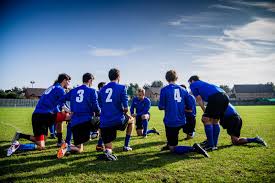Sports have long been a cornerstone of personal development, offering individuals not only the chance to excel physically but also the opportunity to develop invaluable life skills. Teamwork, leadership, and character building are just a few of the qualities that sports foster in athletes, regardless of age or skill level. In this article, we’ll explore the profound impact sports can have on building strong character and cultivating effective teamwork, unlocking each individual’s true potential.
1. Sports and Character Development
Engaging in sports provides a unique environment where personal growth is encouraged. The competitive nature of sports often places athletes in situations that challenge their limits and force them to overcome obstacles. These experiences are pivotal in shaping their character.
Resilience and Perseverance
One of the key ways sports build character is by teaching resilience. Athletes face setbacks, losses, and failures along their journey, but it’s how they respond to these challenges that ultimately defines their success. Perseverance in sports is not just about physical endurance, but about the mental toughness needed to push through difficult moments and come out stronger.
- Example: A basketball player misses several shots but continues to push forward, staying focused on the team’s collective goal.
Over time, athletes learn to embrace failure as a necessary part of growth, becoming more resilient and determined individuals both in and out of the game.
Discipline and Accountability
Success in sports requires strict discipline. From early morning practices to maintaining a healthy lifestyle, athletes are taught the importance of consistent effort and accountability. By adhering to rigorous schedules and following training plans, athletes develop a strong sense of responsibility and self-discipline.
This sense of discipline extends beyond sports. It helps individuals build better habits in their personal and professional lives, contributing to overall success.
Respect for Others
In sports, respecting teammates, coaches, opponents, and officials is non-negotiable. The very nature of sports fosters an environment where mutual respect is vital for success. Athletes learn to value each other’s strengths and work together toward a common goal, developing a sense of camaraderie and collaboration.
2. The Role of Teamwork in Sports
At its core, teamwork is one of the most powerful aspects of sports. Whether it’s a soccer team, basketball team, or relay race, sports require cooperation, communication, and trust. Working in harmony with others to achieve a shared objective is a skill that transcends the field and proves valuable in everyday life.
Communication and Collaboration
Effective communication is crucial for a successful sports team. Team members must work together to understand strategies, provide encouragement, and help each other improve. Athletes learn how to communicate clearly, listen to others, and express their ideas in ways that benefit the entire team.
Through regular training and game-day experiences, athletes develop collaborative problem-solving skills, which are useful in both personal and professional settings. This skill set makes athletes more effective leaders and teammates in any environment.
Building Trust and Cooperation
In sports, trust is paramount. Athletes must trust their teammates to perform their roles, just as teammates rely on their collective effort. This trust is built through practice, shared experiences, and mutual respect. As athletes work toward a common goal, they learn how to cooperate and support each other, even in high-pressure situations.
When a team succeeds or fails together, the bond of trust grows stronger, reinforcing the value of collaboration and unity.
3. Sports as a Platform for Leadership Development
Sports offer an excellent training ground for leadership. Whether it’s a captain who leads the team on the field or an athlete who inspires others through their work ethic, sports help develop leaders who are confident, motivating, and able to make tough decisions under pressure.
Leading by Example
In sports, leadership is not just about giving orders; it’s about leading by example. Athletes who demonstrate hard work, dedication, and a positive attitude motivate others to follow suit. Strong leaders in sports are those who are willing to put in the effort and show their teammates what it means to give 100%.
Problem-Solving and Decision-Making
Athletes are constantly faced with decisions—whether it’s during a game when a split-second choice can change the outcome, or during practice when they must decide how to best improve their technique. These experiences hone critical thinking and problem-solving abilities, which are valuable in any leadership role.
Sports also teach athletes how to remain calm under pressure, make informed decisions, and stay focused on the bigger picture, regardless of challenges.
4. The Social Benefits of Sports Participation
Participation in sports offers several social benefits that help individuals build meaningful relationships. The bonds formed between teammates often last a lifetime, and the experiences shared in sports create a unique and supportive community.
Increased Social Skills and Emotional Intelligence
Interacting with teammates, coaches, and opponents helps athletes develop social skills such as empathy, cooperation, and emotional regulation. These experiences teach individuals how to navigate complex social situations and manage their emotions in both victory and defeat.
Diverse Interactions and Cultural Awareness
Sports also provide the opportunity to interact with people from various backgrounds, fostering cultural awareness and inclusivity. Team sports bring together individuals from diverse cultures, which promotes understanding, tolerance, and unity among teammates, further enhancing the development of emotional intelligence and social connections.
5. Sports and Personal Growth Beyond the Field
The impact of sports extends far beyond the playing field. The character and teamwork skills learned through sports have a lasting impact on personal development, shaping individuals into well-rounded, confident, and goal-oriented individuals.
Confidence Building
Achieving success in sports, whether through winning a competition or mastering a skill, builds confidence. Athletes who succeed in sports are more likely to carry that self-assurance into other areas of life, from academics to their careers.
Time Management and Goal Setting
Athletes must balance their training schedules, competitions, school or work responsibilities, and personal lives. This requires effective time management, goal setting, and prioritization, all of which are transferable skills that contribute to overall success.
Conclusion
The power of sports in building character and teamwork is undeniable. By participating in sports, individuals unlock their potential, developing important life skills such as resilience, discipline, leadership, and collaboration. These qualities not only enhance performance on the field but also prepare individuals to succeed in all aspects of life. Whether you’re an athlete or a coach, embracing the lessons of sports can lead to lasting personal growth and success.
SEO Keywords:
- Power of sports in building character
- Teamwork in sports
- Leadership development through sports
- Character building through athletics
- Benefits of sports on personal growth
- Sports and social skills
- Sports as a tool for teamwork
- Building confidence through sports
- Importance of discipline in sports
- Sports and resilience
- Leadership lessons from sports
- Sports and emotional intelligence
- Teamwork in team sports
- Personal development through sports
- How sports build teamwork and character
This article is designed to rank for keywords related to the character-building and teamwork aspects of sports while offering valuable insights to readers interested in personal development through athletics. Let me know if you need any more tweaks!

